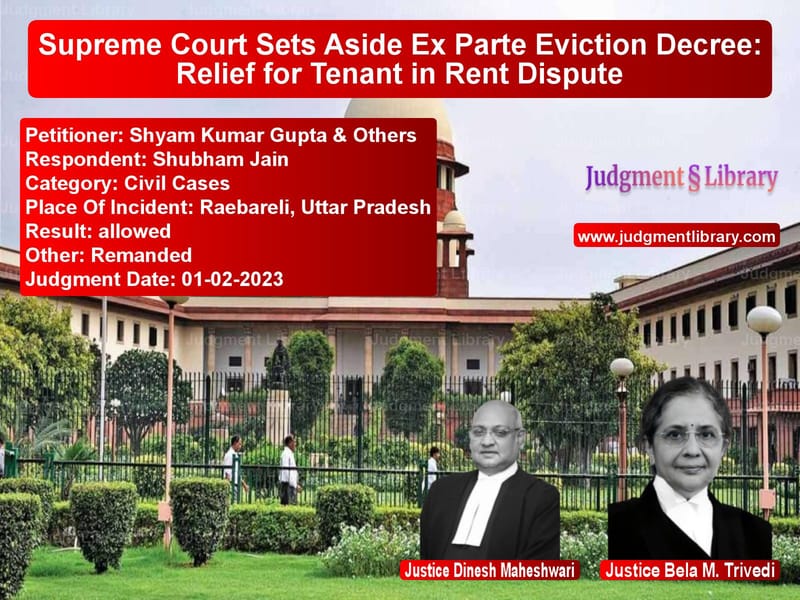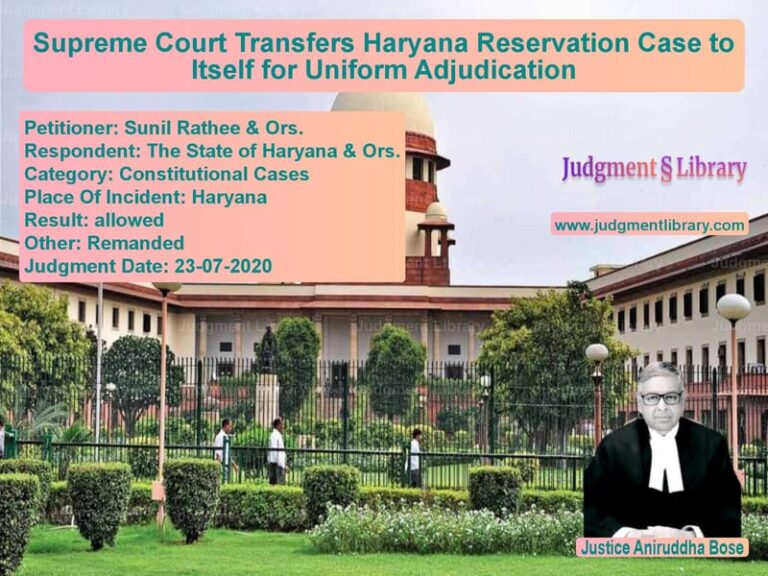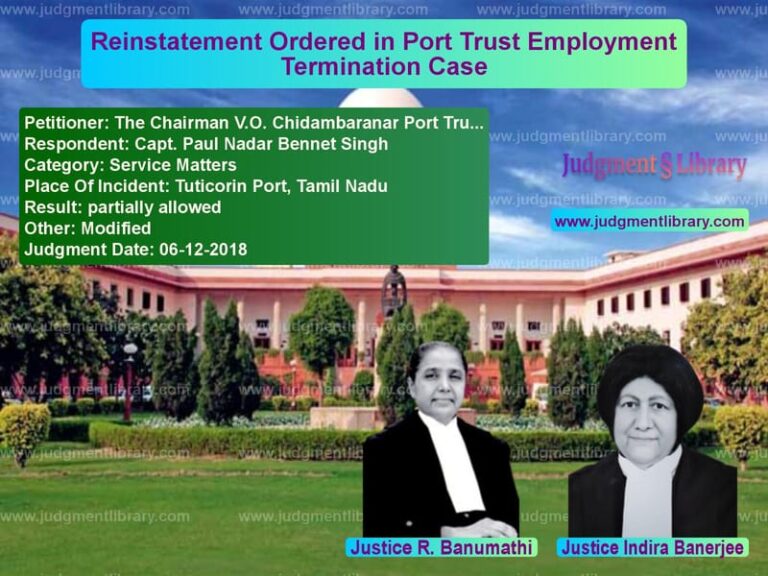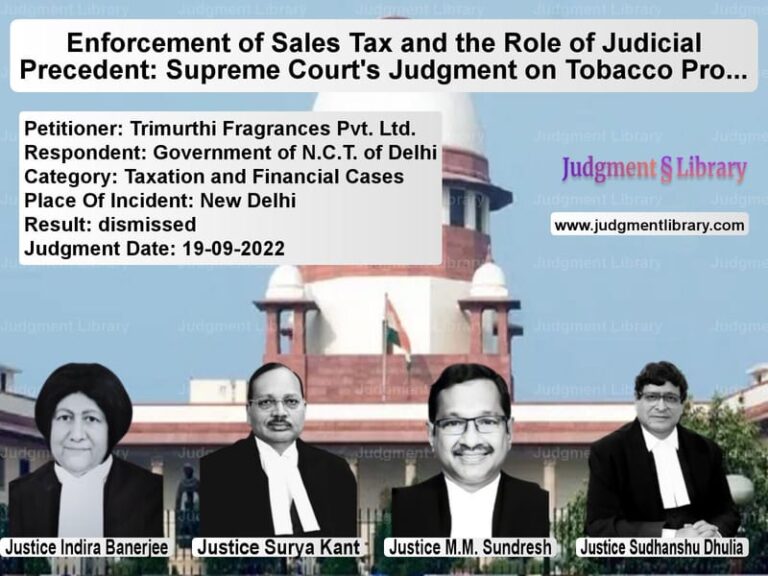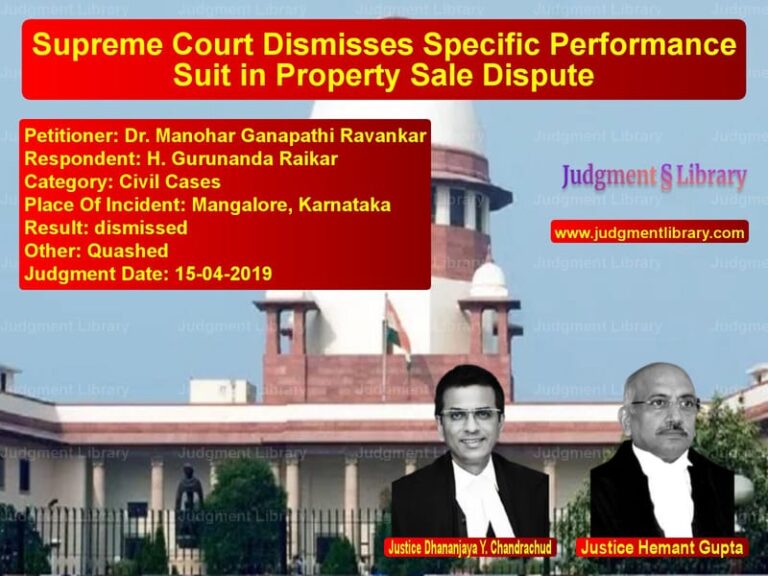Supreme Court Sets Aside Ex Parte Eviction Decree: Relief for Tenant in Rent Dispute
The Supreme Court of India, in the case of Shyam Kumar Gupta & Others vs. Shubham Jain, addressed a significant issue concerning ex parte decrees in rent disputes. The Court ruled that a rigid interpretation of procedural requirements should not result in unfair hardship to a litigant. The judgment reaffirmed the principle that courts should prioritize substantive justice over procedural technicalities.
Background of the Case
The case involved a civil suit for recovery of arrears of rent and ejectment of the tenant from a commercial shop. The landlord, Shubham Jain, filed the suit against the tenant, the father of the appellants, alleging default in payment of rent from February 2015 to May 2015. The suit was filed before the Small Causes Court, which proceeded ex parte after considering the service of summons as sufficient. The trial court decreed the suit on March 9, 2016, directing the tenant to pay arrears of Rs. 8,000 and vacate the premises within two months.
Following the decree, the tenant filed an application under Order IX Rule 13 of the Code of Civil Procedure, 1908 (CPC) to set aside the ex parte judgment. The trial court rejected the application, citing non-compliance with Section 17 of the Provincial Small Causes Court Act, 1887 (PSCC Act). The High Court of Allahabad upheld this decision, leading to the appeal before the Supreme Court.
Arguments by the Appellants (Tenant’s Legal Representatives)
- The tenant’s legal representatives contended that the ex parte decree was obtained without proper service of summons and that their father (the original tenant) was unaware of the proceedings.
- They argued that the deposit of Rs. 11,212 towards arrears of rent and costs was a bonafide attempt to comply with the decree.
- The appellants maintained that procedural lapses should not override substantive justice and that they were willing to pay the outstanding rent.
- They emphasized that the trial court and High Court had taken an overly rigid approach in interpreting Section 17 of the PSCC Act.
Arguments by the Respondent (Landlord)
- The respondent contended that the appellants had failed to comply with Section 17 of the PSCC Act, which mandates full deposit of the amount due under the decree.
- They argued that the ex parte decree was justified, as the tenant had failed to appear in court despite being served.
- The respondent relied on the Supreme Court’s ruling in Kedarnath vs. Mohan Lal Kesarwari, which held that compliance with Section 17 is mandatory.
- The respondent maintained that allowing the appellants to contest the suit would unduly delay the eviction process.
Supreme Court’s Analysis and Judgment
The Supreme Court examined the interpretation of Section 17 of the PSCC Act and the procedural requirements under Order IX Rule 13 CPC. The key observations were:
- Procedural Compliance vs. Substantive Justice: The Court held that while compliance with Section 17 is mandatory, it should not be applied in an overly rigid manner that denies litigants an opportunity to present their case.
- Deposits Made in Good Faith: The Court noted that the appellants had deposited Rs. 1,90,000 towards rent arrears and mesne profits, demonstrating a genuine willingness to comply with the decree.
- Opportunity to Contest the Suit: The Court emphasized that the tenant should not be deprived of a fair trial due to procedural lapses, especially when they had acted in good faith to comply with the decree.
- Setting Aside the Ex Parte Decree: The Court ruled that in light of the tenant’s compliance and the need for a fair trial, the ex parte decree should be set aside.
The Court observed:
“Putting it differently, in terms of Section 17 of the Act of 1887 read with Order IX Rule 13 CPC, the Court could have extended the time for making deposit if so required, or could have put the defendant to the terms of security for performance of the decree.”
Thus, the Court concluded that the trial court and High Court had adopted an overly technical approach and should have allowed the tenant to contest the suit.
Final Verdict
- The Supreme Court set aside the ex parte decree and restored the suit for trial.
- The appellants were directed to file their written statement by February 28, 2023.
- The trial court was instructed to expedite the proceedings and avoid unnecessary delays.
- The deposited amount of Rs. 1,90,000 was made available for withdrawal by the respondent, subject to court approval.
This judgment reinforces the principle that courts should not prioritize procedural rigidity over substantive justice. It ensures that tenants facing eviction have a fair opportunity to contest claims and present their case before being deprived of their right to occupy the premises.
Petitioner Name: Shyam Kumar Gupta & Others.Respondent Name: Shubham Jain.Judgment By: Justice Dinesh Maheshwari, Justice Bela M. Trivedi.Place Of Incident: Raebareli, Uttar Pradesh.Judgment Date: 01-02-2023.
Don’t miss out on the full details! Download the complete judgment in PDF format below and gain valuable insights instantly!
Download Judgment: shyam-kumar-gupta-&-vs-shubham-jain-supreme-court-of-india-judgment-dated-01-02-2023.pdf
Directly Download Judgment: Directly download this Judgment
See all petitions in Landlord-Tenant Disputes
See all petitions in Contract Disputes
See all petitions in Judgment by Dinesh Maheshwari
See all petitions in Judgment by Bela M. Trivedi
See all petitions in allowed
See all petitions in Remanded
See all petitions in supreme court of India judgments February 2023
See all petitions in 2023 judgments
See all posts in Civil Cases Category
See all allowed petitions in Civil Cases Category
See all Dismissed petitions in Civil Cases Category
See all partially allowed petitions in Civil Cases Category

